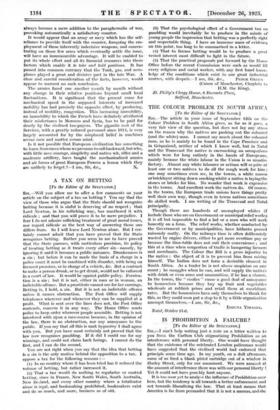THE COLOUR PROBLEM IN SOUTH AFRICA [To the Editor of
the SPECTATOR.] SIR,—The article in your issue of September 12th on the Colour Problem in South Africa gives, as far as it goes, a very fair view of the question, but does not lay any stress on the reason why the natives are pushing out the coloured (and the white) man. I cannot say much about the coloured man, as he is mainly to be found in the Cape Province and in Griqualand, neither of which I know well, but in Natal and the Transvaal the native is encroaching on occupations which were for long entirely in the hands of Europeans, mainly because the white labour in the Union is so unsatis- factory. Almost any white labourer or artisan will re auire at least one or two natives to do all the rough work for him one may sometimes even see, in the towns, a white mason or bricklayer sitting down smoking whilst a native is laying the stones or bricks for him. No wonder that work is expensive in the towns. And excellent work the natives do. Of course, in the towns, the European trade unions have things pretty well their own way, though even in towns natives sometimes do skilled work. I am writing of the Transvaal and Natal. principally.
Though there are hundreds of unemployed whites (I include those who are on Government or municipal relief works), it is all but impossible to find a lad or a man who will work honestly on a farm. The relief works, whether conducted by the Government or by municipalities, have hitherto proved ruinously costly. On the railways time is often deliberately wasted by engine drivers, either to get more overtime pay or, because the time-table does not suit their convenience ; and this at a time when congestion of traffic is hampering farmers and merchants. The Colour Bar Bill is a gross injustice to the native : the object of it is to prevent him from raising himself. The Indian does not form a desirable element in South Africa. As a trader he is not above suspicion on any count ; he smuggles when he can, and will supply the natives with drink or even arms and ammunition, if he has a chance. In the towns, the " coolies " cause a good deal of annoyance to housewives because they buy up fruit and vegetables wholesale at rubbish prices and retail them at exorbitant rates. But the housewives have only themselves to thank for this, as they could soon put a stop to it by a little organization amongst themselves.—I am, Sir, &c.,
Natal, October 21st. INDUNA






































 Previous page
Previous page